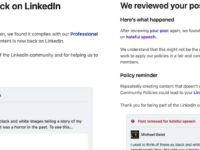The Online Harms Act was only introduced two weeks ago, but already it appears that the government is ready to run back the same playbook of gaslighting and denials that plagued Bills C-11 and C-18. Those bills, which addressed Internet streaming and news, faced widespread criticism over potential regulation of user content and the prospect of blocked news links on major Internet platforms. Rather than engage in a policy process that took the criticism seriously, the government ignored digital creators (including disrespecting indigenous creators) and dismissed the risks of Bill C-18 as a bluff. The results of that strategy are well-known: Bill C-11 required a policy direction fix and is mired in a years-long regulatory process at the CRTC and news links have been blocked for months on Meta as the list of Canadian media bankruptcies and closures mount.
Bill C-63, the Online Harms Act, offered the chance for a fresh start given that the government seemed to accept the sharp criticism of its first proposal, engaging in a more open consultative process in response. As I noted when the bill was first tabled, the core of the legislation addressing the responsibility of Internet platforms was indeed much improved. Yet it was immediately obvious there were red flags, particularly with respect to the Digital Safety Commission charged with enforcing the law and with the inclusion of Criminal Code and Human Rights Act provisions with overbroad penalties and the potential to weaponize speech complaints. The hope – based on the more collaborative approach used to develop the law – was that there would be a “genuine welcoming of constructive criticism rather than the discouraging, hostile processes of recent years.” Two weeks in that hope is rapidly disappearing.











